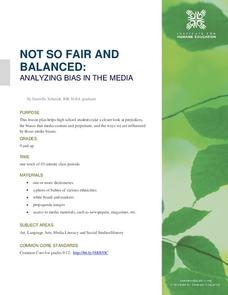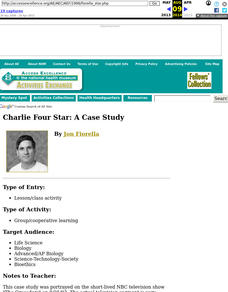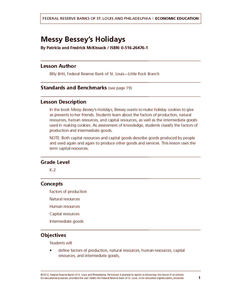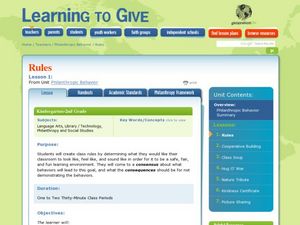Newseum
Am I Being Fair?
Young journalists use four strategies from an "Am I Being Fair?" tip sheet to check for and counter personal biases about a topic. Scholars apply the strategies to an article about the best pizza as guided practice. Participants then...
Deliberating in a Democracy
Globalization and Fair Trade
Have you ever traded something? How do you know you got a good deal? Scholars use case studies and research to determine the role of globalization in fair trade. Class members examine consumer demand and competition bring to light the...
Curated OER
Fairness
Second graders define "fairness." They discuss importance of treating all people with fairness, verbally list way they can be fair to others, and keep track of fairness they see in the classroom by recording incidents on a "Fairness and...
Newseum
Reporting Part III: Staying Objective
The third and final lesson in the Reporting series tests young journalists' ability to be objective in reporting contentious topics. After brainstorming a list of contentious topics that interest them, the class selects one, and...
Anti-Defamation League
Student Dress Codes: What's Fair?
The controversy over school dress codes continues. The debate involves questions like, why is there a policy? Who sets the policy? Who enforces the policy? What is a fair policy? Tweens and teens have an opportunity to engage in the...
Curated OER
Paper Clip Game for Learning the Value of Rules
Students explore the components of good rules and their importance in society. Consistency and fair application for the maintenance of order is emphasized as paper clips and the rules of a game are manipulated.
Institute for Humane Education
Not So Fair and Balanced: Analyzing Bias in the Media
Life is not always fair. Who's heard that before? This same concept moves to a larger scale using prejudice and bias. Pupils discuss where prejudice attitudes derive and how they develop throughout life. Reading comprehension...
Curated OER
Fair Responses to Unfair Acts
Students understand the sacrifices and problems in undoing an unfair situation. In this unfairness instructional activity, students discuss the reasons for the Montgomery Boycott and discuss worksheet and feelings about dealing with...
Canadian Civil Liberties Education Trust
That’s Not Fair!
As part of a series of critical thinking exercises, kids consider issues of social justice, especially the factors that must be considered when trying to balance conflicting rights and freedoms.
Smithsonian Institution
Strength in Solidarity: Coalition of Immokalee Workers and the Campaign for Fair Food
Not all food is created equal. The lesson dives into the world of migrant farm workers to show their struggles to earn livable wages and better working conditions. Academics learn why the Coalition of Immokalee Workers was created and...
Curated OER
Fairness
Learners distinguish between that which is fair and that which is unfair. They offer solutions as to how to remedy a seemingly unfair situation. They also engage in a role play situation and offer solutions.
Curated OER
What is Justice?
Eighth graders discuss justice and fairness. In this equitable treatment of others lesson, 8th graders say the Pledge of Allegiance and read a passage from a blog. Students discuss the terms: fair, just, and equitable.
Curated OER
African Stereotypes - Let's Be Fair
Students evaluate pictures and statements about Africa as "fair" and "unfair." They analyze that stereotypes are unfair and contribute to a bulletin board encouraging the stopping of stereotypes.
C-SPAN
Survey Analysis- Public Perceptions of Voting and Elections
The perception of fairness in elections becomes more important with each passing election. Using data from a C-SPAN poll, budding historians consider the differences between how people perceive elections. The resource includes videos of...
Curated OER
Pumpkin Fallacies
Young scholars complete circumference activities using a pumpkin and explore treating people fairly in regards to their physical characteristics. In this math and character lesson, students view images of pumpkins and describe them....
Equality and Human Rights Commission
Equality
Despite passing the Equality Act in 2010 covering many groups, gender inequality in Great Britain remains. Scholars investigate the concept of equality with a presentation, discussion, and hands-on timeline activities. The seventh lesson...
Center for History Education
Was the Stamp Act Fair?
Pledge your loyalty to the king and the Stamp Act or sign an oath against the tax. After simulating an in-class tax for school supplies, young historians consider the reasons for the Stamp Act and similar colonial policies. The...
Center for History Education
Cold War Case Files: The Rosenberg Trial - Was Justice Fairly Served?
The Rosenbergs—executed for their role in a Soviet-era spy ring—continue the captivate the American imagination. Using a history lab format, young historians examine the trove of documents associated with the case, including photographs...
Angel Island Immigration Station Foundation
Exclusion "Act"ivity
Two simulations highlight the feelings individuals experienced when immigrating to Angel Island. During the first simulation, scholars listen to and answer questions, divided based on their answers. The second simulation pins learners as...
Curated OER
Charlie Four Star: A Case Study
Engage in a class debate dealing with the allocation of organs to those waiting for a transplant. How do they decide who gets a transplant and who doesn't? Learners attempt to determine what is fair for the individual requiring an organ...
Curated OER
Go Fish!
Students share a bowl of goldfish crackers. In this lesson on sharing, students see how a limited resource goes furthest when it is evenly shared. Students are allowed to take as many crackers as they would like, and then in contrast,...
Federal Reserve Bank
Messy Bessey's Holidays
Teach your class some fairly complex terms—factors of production, human resources, capital resources, natural resources, and intermediate goods—with a storybook (Messy Bessey's Holidays), plenty of visuals and handouts, and related...
Curated OER
Philanthropic Behavior
Youngsters create class rules by determining the environment they would like to have in their classroom. They come to a consensus about how to have a safe, fair, fun learning environment by discussing the rules in the Karla Kustin poem,...
NPR
Is There Really an Immigration Line?
If you've ever looked at the US immigration system, you know that it is complex and a source of controversy. An insightful lesson plan encourages learners to conduct their own analyses of the US immigration system by asking them to...
Other popular searches
- Character Education Fairness
- Character Counts Fairness
- Honesty and Fairness
- Fairness and Integrity
- Judicial Fairness
- Justice and Fairness
- Lessons on Fairness
- Democracy Fairness
- Probability Fairness
- Fairness: Character Counts
- Fairness Lesson Plans
- Philosophy for Kids Fairness







